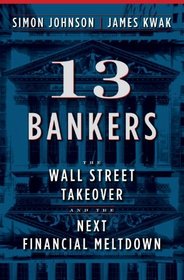While I think this book is a good history of the regulation changes that occurred in banking from the mid to late 90s, I do not think this book does that great a job explaining the recent banking crisis. The authors clearly believe that the changes in regulation and lax regulators caused the crisis and that better/stronger regulation would fix it. They however fail to explain how if the regulators are so co-opted by the big banks that regulation on its own will work. I also feel that the authors let Fred and Fannie Mae's role in the collapse and their cozy relationship with both parties in Washington off too lightly. I wish they had spent more time developing how we measure too big to fail and how we limit or break up banks that reach that threshold.
This book will appeal manly to people who have an interest in financial and economic history, otherwise it will seem a slow read. It is a good summery of the way banking has changed over the last three decades and does give good insight into how the regulators as well as the regulations failed us over the last five years.
This book will appeal manly to people who have an interest in financial and economic history, otherwise it will seem a slow read. It is a good summery of the way banking has changed over the last three decades and does give good insight into how the regulators as well as the regulations failed us over the last five years.





![header=[] body=[Get a free book credit right now by joining the club and listing 5 books you have and are willing to share with other members!] Help icon](/images/question.gif?v=90afaeb39)
